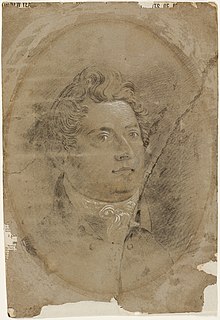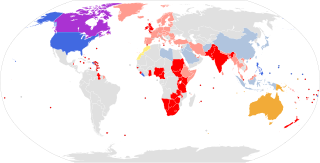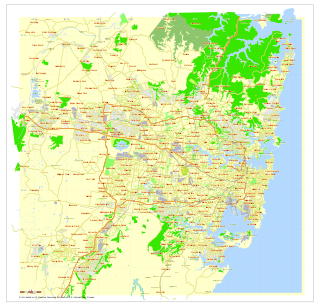Australian English is the set of varieties of the English language native to Australia. Although English has no official status in the Constitution, Australian English is the country's national and de facto official language as it is the first language of the majority of the population.

Macquarie Island, a UNESCO World Heritage Site, lies in the southwest Pacific Ocean, about halfway between New Zealand and Antarctica. Regionally part of Oceania and politically a part of Tasmania, Australia since 1900, it became a Tasmanian State Reserve in 1978 and was inscribed on the World Heritage List in 1997.

The Macquarie Dictionary is a dictionary of Australian English. It is generally held by universities and the legal profession to be the authoritative source on Australian English. It also pays considerable attention to New Zealand English. Originally it was a publishing project of Jacaranda Press, a Brisbane educational publisher, for which an editorial committee was formed, largely from the Linguistics department of Macquarie University in Sydney, Australia. It is now published by Macquarie Dictionary Publishers an imprint of Pan Macmillan Australia Pty Ltd. In October 2007 it moved its editorial office away from Macquarie University to the University of Sydney., and then later to the Pan Macmillan offices in the Sydney central business district.

Major General Lachlan Macquarie, CB was a British Army officer and colonial administrator from Scotland. Macquarie served as the fifth and last autocratic Governor of New South Wales from 1810 to 1821, and had a leading role in the social, economic and architectural development of the colony. He is considered by historians to have had a crucial influence on the transition of New South Wales from a penal colony to a free settlement and therefore to have played a major role in the shaping of Australian society in the early nineteenth century. In 1816 Macquarie gave orders that led to the Appin Massacre of Gundungurra and Dharawal people.
In English language punctuation, a serial comma or series comma is a comma placed immediately before the coordinating conjunction in a series of three or more terms. For example, a list of three countries might be punctuated either as "France, Italy, and Spain", or as "France, Italy and Spain".

Francis Howard Greenway was an English-born architect who was transported to Australia as a convict for the crime of forgery. In New South Wales he worked for the Governor, Lachlan Macquarie, as Australia's first government architect. He became widely known and admired for his work displayed in buildings such as St Matthew's Church in Windsor, New South Wales, St James' Church, Sydney and Hyde Park Barracks, Sydney.

The State Library of New South Wales, part of which is known as the Mitchell Library, is a large heritage-listed special collections, reference and research library open to the public. It is the oldest library in Australia, being the first established in New South Wales in 1826. The library is located on the corner of Macquarie Street and Shakespeare Place, in the Sydney central business district adjacent to the Domain and the Royal Botanic Gardens, in the City of Sydney, New South Wales, Australia. The library is a member of the National and State Libraries Australasia (NSLA) consortium.
Australian English is a major variety of the English language spoken throughout Australia. Most of the vocabulary of Australian English is shared with British English, though there are notable differences. The vocabulary of Australia is drawn from many sources, including various dialects of British English as well as Gaelic languages, some Indigenous Australian languages, and Polynesian languages.

Many of the differences between American and British English date back to a time when spelling standards had not yet developed. For instance, some spellings seen as "American" today were once commonly used in Britain and some spellings seen as "British" were once commonly used in the United States. A "British standard" began to emerge following the 1755 publication of Samuel Johnson's A Dictionary of the English Language, and an "American standard" started following the work of Noah Webster and in particular his An American Dictionary of the English Language, first published in 1828.
The Latin adverb sic inserted after a quoted word or passage indicates that the quoted matter has been transcribed or translated exactly as found in the source text, complete with any erroneous, archaic, or otherwise nonstandard spelling. It also applies to any surprising assertion, faulty reasoning, or other matter that might be likely interpreted as an error of transcription.
Oxford spelling is the spelling standard used by the Oxford University Press (OUP) for British publications, including its Oxford English Dictionary (OED) and its influential British style guide Hart's Rules, and by other publishers who are "etymology conscious", according to Merriam-Webster.
Although Australia has no official languages, English has been entrenched as the de facto national language since European settlement. Australian English is a major variety of the language with a distinctive accent and lexicon, and differs slightly from other varieties of English in grammar and spelling. General Australian serves as the standard dialect.
Australian English is relatively homogeneous when compared with British and American English. The major varieties of Australian English are sociocultural rather than regional, being general, broad and cultivated Australian.

A style guide or manual of style is a set of standards for the writing, formatting and design of documents. It is often called a style sheet, although that term may have other meanings. These standards can be applied either for general use, or be required usage for an individual publication, a particular organization, or a specific field.

Meredith Anne Burgmann is an Australian politician and Labor Party member and a former President of the New South Wales Legislative Council.

No worries is an expression seen in English meaning "do not worry about that", "that's all right", or "sure thing". It is similar to the American English no problem. The phrase is widely used in Australian speech and represents a feeling of friendliness, good humour, optimism and "mateship" in Australian culture. The phrase has been referred to as the national motto of Australia.

Tina McKenzie is an Australian wheelchair basketball player. She participated in the 2004 Summer Paralympics in Athens, where she won a silver medal; in the 2008 Summer Paralympics in Beijing, where she won a bronze medal; and the 2012 Summer Paralympics in London, where she won a second silver medal. After becoming an incomplete paraplegic as a result of a fall from a building in 1994, she took up wheelchair tennis and later wheelchair basketball. She joined the Australia women's national wheelchair basketball team, known as the Gliders, in 1999, and played her first international match at the 2002 World Wheelchair Basketball Championship in Japan. She has over 100 international caps.

Janel Manns is an Australian wheelchair tennis player. She has been selected to represent Australia at the 2012 Summer Paralympics in tennis.
Joanne Faulkner is an Australian writer, philosopher and Future Fellow in Cultural Studies at Macquarie University. She is known for her research on the ontology of childhood, Nietzsche's thought, and the ethics of innocence.












